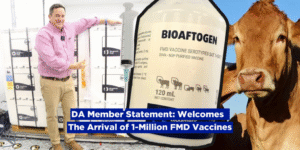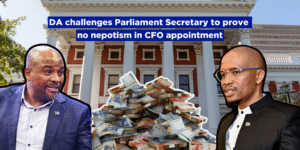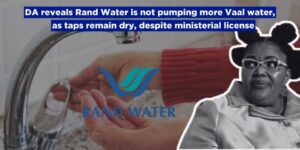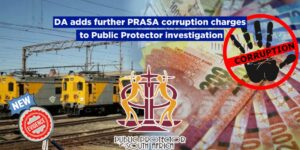Note to Editors: The following remarks were delivered by Democratic Alliance (DA) leader, Mmusi Maimane, at the Cape Town Press Club today.
Ladies and gentlemen
Members of the Press
Fellow South Africans
A quarter of a century ago we began a journey towards freedom. We weren’t free yet. As Nelson Mandela articulated back then, we had merely achieved the freedom to be free.
But there we were, boarding the bus with all our baggage from the past and all our hope for the future, and we set off towards a free country. A place where individual rights would thrive, where men and women could find work, own their own property, build their own homes.
We were all eager travellers, excited about the journey. We all held on to hope.
However, twenty-five years later our journey has come undone. We have taken so many wrong turns, suffered so many bad drivers and hit so many potholes over the years that we are now completely lost and our bus can barely move.
This path has now brought us to a crossroads, and we have a choice to make: Do we remain on the same broken-down bus, on the same dead-end road, or do we change buses here?
Do we stick with the liberation movement that has stalled our economy and failed our people – as every liberation movement on this continent has done over the last half a century – or do we opt for change?
And it’s not only failed liberation movements that we are emulating. The ANC has now started borrowing from the Apartheid government’s playbook too. When the National Party ran out of money they introduced “prescribed assets” to boost their coffers. Ramaphosa’s ANC seems intent on doing the same.
Is this really the path we want to be on? Are we to believe that this broken-down ANC bus will reach a different destination by merely swapping drivers? Because nothing in its track record – or indeed the history of liberation movements – suggests that this is likely.
If we want a different outcome, we must go out and choose it.
Our history in South Africa has always been one of division. Between black and white. Between rich and poor. Between ownership and dispossession.
The struggle for liberation was meant to change this, but the reality is that we are busy repeating history. Over the past 25 years we have, once again, become two distinct South Africas.
On the one side are those born into the right circumstances – those who receive quality education, those with access to opportunities, those who participate in the economy, those who own their property, those who know the right people and have friends in the right party. The economic insiders.
And on the other side are the millions of South Africans who find themselves locked out of all these opportunities. These are the people without a head-start in life. Born into poverty, condemned to a failed education and cast out into a world of unemployment and hopelessness, they are economic outsiders.
Any government intent on building an inclusive, prosperous South Africa should make it their primary business to close the gap between these two groups. But after 25 years of ANC government, this gap is wider than ever before.
And it is widening because we have a government that deliberately puts up barriers between the insiders and the outsiders. A government that protects the employed at the expense of the unemployed and has turned its back on the most vulnerable in society.
Whether through legislation such as labour laws and the new National Minimum Wage, or through corrupt and criminal practices like jobs-for-pals and jobs-for-sex, this ANC government continuously builds walls between the haves and the have-nots.
If you happen to be born into the wrong South Africa, life is a continuous struggle.
Nearly four out of ten adults in the labour market can’t find work. Most of these people are under 30 years old.
And Reserve Bank data shows that the poor are getting poorer as real per capita income has fallen in the past 5 years.
Thanks to our runaway unemployment we are now the most unequal society in the world.
Half our households are headed by women, and most of these households are desperately poor.
14 million South Africans go hungry every day. One in five children is stunted due to malnutrition.
This is what the “other” South Africa looks like. The one not protected by unions or minimum wages. The one sustained almost entirely by meagre social grants.
The face of this poverty is still largely female, young, rural and black.
A child born into this South Africa will go to schools where she will be failed, over and over again. Failed by crumbling infrastructure. Failed by the lack of toilets and clean water. Failed by the lack of textbooks. Failed by massive class sizes. And failed by teachers who can’t and won’t teach the curriculum.
In this South Africa children will exit the Foundation Phase and reach Grade 4 without the ability to read with any comprehension. They will struggle through the grades and, if they’re lucky, they will see the inside of a matric exam hall. More than half won’t.
In this South Africa, the real matric pass rate, once you factor in drop-outs, is below 40%. And the chances of finding work after school, even lower than that.
My son started Grade 1 last week, and I took him to school on his first morning. As I saw him settle into his class, surrounded by the boys who will become his friends and peers over the next twelve years, I couldn’t help but think of all those children starting out in the other South Africa that morning.
Surely it must be our goal to give these children the same chance in life as my son and his classmates have. Surely we should be focusing all our efforts on building one South Africa from this fractured and divided country of ours.
I believe, with four months left until we go to the polls, that we have an opportunity to do just that. I believe our choice at this crossroads is simple.
We can either choose, once again, to reward the liberation movement and extend their mandate for another five years. Despite their failed track record in government. Despite their record of criminality and corruption. Despite their stated intentions for our economy. Despite the way in which they have welcomed the disgraced Jacob Zuma back into the fold. Despite returning, to their national list, the very same people who looted the state alongside Zuma.
Or we can choose a different path – a solution outside of the liberation movement. A solution that doesn’t require poor South Africans to sacrifice their future just to remain loyal to a liberation movement that failed to transition into a government
We can either look to the past and remain rooted in the past, or we can turn around and step into the future.
The reality is, we have almost run out of time to do so. And that’s why the election in May will be crunch time for our country. I know this is said about every election, but our situation has deteriorated to the point where our decision at the polls in May will have profound consequences for us.
If we want to pull South Africa back from the brink, then we are going to have to recognise and name our troubles for what they are.
We are going to have to remove the blinkers of lowered expectations and make a brutally frank assessment of our current path and trajectory.
This assessment has to recognise that unemployment, along with unfair access to scarce jobs, is the very core of our problems.
Every other challenge we have – poverty, inequality, crime, social unrest – can be solved if we can find a way to put more people into jobs.
Or, seen the other way round, if we can’t secure a dramatic turnaround in our unemployment rate, all our efforts to curb the other ills in our society will be in vain.
The ability of a party to enable and nurture job creation should be the make-or-break factor when choosing a government in South Africa.
And this is why Saturday’s ANC manifesto launch was such a red flag.
One year into his term and four months before the election, President Ramaphosa had the perfect opportunity to admit to South Africans the full scale of our problems, and to lay out a bold new route map for our way forward.
But he did neither of these things. Instead, he all but admitted defeat.
Why do I say this?
The most telling moment from his entire time at the podium was the number he put forward as his target for job creation: 275,000 per year, which is the number that emerged from his Jobs Summit in October of last year.
But let me tell you the two problems with this number:
Firstly, the ANC cannot achieve this. There is a bitter irony in the fact that the number of unemployed South Africans grew by almost exactly this same number – 278,000 – since Ramaphosa’s term as president began at the start of 2018.
During this time, nothing has changed to make growth and jobs more likely. If anything, the populist, economy-killing rhetoric has been ramped up. Yet we are now asked to believe that they are going to miraculously turn the tide on the jobs carnage.
The ANC can’t even stop our unemployment rate from going up, never mind bring it down.
But there is an even bigger problem with this number of 275,000: it’s not enough. In fact, it is not even close.
There are currently 9.8 million unemployed South Africans. Even if our labour force remained the same size it would take over 35 years, at Ramaphosa’s rate, to clear that number.
And of course, our labour force won’t remain the same size. The cohort of children entering our schools every year is over a million. And as they enter, a similar number exit on the other end and join the labour force, whether directly from school or via other routes.
That is why Ramaphosa’s best-case-scenario promise of 275,000 jobs per year – while completely unrealistic and unattainable – won’t even scratch the surface. We need far more than that.
There was a time, not so long ago, when the ANC was throwing around big jobs targets. In 2010 their magic number was 5 million jobs by 2020. Four years later, at their 2014 manifesto launch, Jacob Zuma spoke of 6 million job opportunities within five years.
Since then, the ANC’s jobs target has steadily come down as the gap between what we need to add and what we continue to lose grows wider and wider.
They know they cannot continue to speak of millions of jobs when we have a net loss of hundreds of thousands every year.
And this is why Ramaphosa’s jobs offer is nothing but a meek white flag in the face of the unemployment onslaught.
A commentator summed it well when he said the ANC’s manifesto is not about the long-term dream of our nation but rather about staying in power.
It’s a compromise on some issues, and a capitulation on others.
It doesn’t address the single biggest threat to our financial position: Eskom. Years of corruption, mismanagement and state capture has seen the utility’s debt rocket to over R400bn, with plans to increase this debt to R600bn over the next three years.
It continues to absolve the ANC from decades of land reform and land restitution failure, using land expropriation without compensation as a dangerous and damaging populist rally cry.
And it threatens us with prescribed assets which, along with plans to nationalise the Reserve Bank, will hammer the final nails in our economy’s coffin.
It’s not a manifesto, it’s a wake-up call to South Africans.
As we grapple with our own path forward, we could also do well to reflect on the situation in Zimbabwe right now. They too were asked to believe that a new leader of a failed liberation movement would steer them towards a different outcome.
And now they are discovering that a government runs on systems and not individuals. If those systems are broken, it doesn’t matter who is in charge.
This is the story of liberation movements and their splinter parties everywhere.
The ANC – along with every other so-called revolutionary party that has sprung up recently like mushrooms in the forest – desperately wants you to believe that you still need to be liberated from something or someone.
That’s all they know, and so they create imaginary enemies and wage imaginary wars. Their language, their ideology and their ideas got stuck a long time ago.
The more they fail at being a government, the more they will try to convince you that you need them for the struggle.
And, having destroyed the systems and the institutions that make up a government, they will ask you to put your hope and your trust in individual leaders – personalities whom they will try to elevate to icons.
But that’s not how a government works. That’s not how a capable state is built. If you want a better government, then you have to choose a better government.
I believe the DA is that government.
We have a vision – a dream – for our nation that is best expressed as One South Africa for All.
A nation united not only along racial lines, but economically too. Where we can unlock the potential of our people and give them the independence and freedom that comes with work.
Of course, we must ultimately aim to put everyone who wants to work in a job. But can you imagine what a difference it would make if we could start by putting a job in every home? At least one steady income in households where there were previously none.
Can you imagine how a job in every home would lift these households out of abject poverty and into a space where they have dignity and independence?
The DA can do this. I am not asking you to blindly believe me. I am asking you to look at our track record.
Over the past 12 months, 188,000 new jobs were added across the whole of South Africa. Of these, 95,000 came from the Western Cape. That’s over half the jobs from a province that represents less than one eighth of the population.
If you want to compare this number to Ramaphosa’s annual target of 275,000, the DA-run Western Cape produced more than a third of these jobs in 12 months. And remember, this was a period that followed three years of intense drought.
If this is what a DA provincial government can achieve under the hostile conditions of an ANC national government, just imagine the possibilities if we were able dictate policy nationally.
That would be real change. That would begin to break down the walls between the insiders and the outsiders of our economy.
Now add to that the financial liberation that comes with owning the title deed to your own property – being able to secure a loan against it, being able to leave it to your children in your will.
And then add to that the freedom that comes with safe neighbourhoods, free from gangs and drug dealers. Neighbourhoods protected by a vastly improved SAPS – trained, funded, equipped and motivated.
This is the South Africa that the DA wants to build.
A South Africa where the rights of every individual are upheld and protected.
A South Africa that rolls out the red carpet for investors and cherishes entrepreneurs and micro-enterprises.
A South Africa with a government that is open and transparent, and without the continuous shadow of corruption hanging over it.
A South Africa where both government and the civil service are capable, and where only the best are hired.
A South Africa where our citizens feel safe.
A South Africa where everyone stands equal before the law, and where all are held to account.
But most importantly, a South Africa where the walls between the insiders and the outsiders have come down and where everyone can enjoy the dignity that comes with having a job.
That is what a DA government will fight for.
We understand that it is not government that creates these jobs, but rather a thriving private sector. We know that a government’s task is to provide the climate that makes this possible.
This means treating small businesses and entrepreneurs as jobs heroes, supporting them where you can, and trying to streamline as much of the red tape that so often trips up SMME’s.
It means recognising that our cities are best placed to drive growth and jobs, and ensuring that they deliver the infrastructure that investors require – reliable electricity, clean water, efficient transport networks, safety and security and high-speed fibre.
It means recognising which sectors of the economy have the best job-creating potential, and focusing most of your resources on these sectors.
It means caring passionately about the youth, and doing all you can to open opportunities for them and give them work experience. Internships, apprenticeships, jobs centres – these are all top priorities in DA governments.
And we have more ideas in the pipeline for the youth, like a year’s voluntary national civilian service for school leavers.
These are the reasons why the only DA-run province in the country has, by far, the lowest unemployment rate. It is why young people stream here from all over to find work.
That is what you get in a DA government. We serve the people for whom we govern. We are not perfect but we aim high and we work hard, and it shows. We get stuff done.
The message we will be taking to communities across the country over the next few months will spell out our vision for the kind of South Africa we’d like to build, and we will focus specifically on five election pledges:
- We will fight corruption at every sphere and every level of government, and we will send those found guilty to jail for 15 years.
- We will fix the South African Police Service so that it is able to protect and serve the citizens of this country. This means hiring more officers, training them properly and making sure they are well equipped. It means bringing back the disbanded specialist police units and appointing only qualified and capable SAPS leadership.
- We will grow an economy that’s inclusive, and we will create fair access to jobs. This means no more cash for jobs, no more sex for jobs and no more jobs reserved for those with the right party connections and membership.
- We will secure our country’s borders and fix Home Affairs, so that those who want to enter here legally can do so, but those who want to come here illegally are kept out.
- We will speed up the delivery of basic services to all communities across South Africa.
That is our pledge to the people of this country. That is what you will get in a DA government.
A government that fights for the rights of each and every citizen, as enshrined in our Constitution.
A government that fights for the dignity of each and every citizen through better access to jobs and better access to basic services.
A government that fights to keep the people’s money and the people’s resources out of the pockets of the corrupt.
There is no other party doing any of these things. Standing at the crossroads of these elections, the choice before us should be clear: We must choose a different bus, not just a new driver.
Only one party has shown that it is committed to building one South Africa for all, and that party is the DA.
Thank you.




